#japanese occupation burma
Explore tagged Tumblr posts
Text
Burma 1942: The Japanese Invasion: Both Sides Tell the Story of a Savage Jungle War :: Ian Lyall Grant & Kazou Tamayama

View On WordPress
#0-952-10831-3#battle bilin river#battle pegu#books written by ian lyall grant & kazou tamayama#brewster buffalo aircraft#bridge kala chaung#british military history#burma history#burmese campaigns#colonel harada stuc#curtiss p tomahawks#first edition books#japanese military history#japanese occupation burma#joseph w stilwell#kokkogwa#kyaukse#moulmein#mountain battery regiment#rangoon#seizo sakurai#shwedaung#sing myitnge river#tenasserim#william slim#yenangyaung
1 note
·
View note
Text
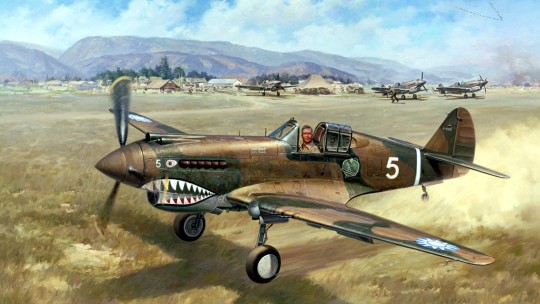
1942 05 04 Alone Above Baoshan - Roy Grinnell
the moment on May 4, 1942, that AVG Flight Leader Charlie Bond races off from the small airfield at Baoshan, at the controls of a Curtiss Tomahawk fighter to single handedly intercept a force of 50 Mitsubishi Ki-21 "Sally" twin engine bombers of the Imperial Japanese Army Air Forces, that were attacking the city of Baoshan. The Burma Road ran through the center of the small city, and at that moment the city was packed with thousands upon thousands of refugees who were desperately fleeing the fall of Burma and the advancing Japanese Army. Apparently the target of the Japanese bombers that day was the Burma Road itself, and denying its use to the Chinese Army, with the tragic result that many thousands of these refugees died under the rain of Japanese bombs and crumbling buildings.As the western flank of General Chennault's carefully built, and usually very effective early warning network had been put out of action by the fall of Burma, the small AVG detachment that Chennault had placed at Baoshan, was caught on the ground by the attack, and with Japanese bombs already falling towards their targets, only Charlie was able to get to his aircraft and get off the ground, and as Roy has captured in his painting, Charlie took to the air without properly securing his parachute harness, seat belts and flying helmet.After a long, climbing pursuit to the southwest, Charlie caught up with the tail-end element of the Japanese bombers and quickly shot down one of the Ki-21's and possibly damaged a second. Unfortunately, Charlie was unaware that the Japanese bombers were being escorted by a chutai (squadron) of Nakajima Ki-43 "Oscar" fighters, three of which broke off, and followed him back to Baoshan. As Charlie flew over the Baoshan airstrip, he executed a perfect "victory roll," but at the top of his rolling maneuver, the three unseen "Oscars" dropped in behind him, and proceeded to blast his Tomahawk out of the sky. Somehow, despite the tremendous damage to his aircraft, Charlie managed to bailout and land safely with only minor burns to his shoulders and the back of his neck. AVG Flight Leader Peter Wright, who along with AVG Flight Leader Ben Foshee were part of a truck convoy that was driving the last of the AVG's equipment and supplies out of Burma, and were driving through Paoshan at the time of the Japanese attack, shared with me during a Second World War Symposium co-sponsored by the Yunnan Municipal Government and the SAAHF in Kunming in 2004, that both he and Foshee saw that the Japanese bombers were being lead by a large, four engine aircraft, that they could not identify. Peter also mentioned that the four engine aircraft appeared to be painted silver With the Japanese occupation of Burma, the Imperial Navy moved a number of their huge, four engine Kawanishi H8K "Emily" flying boats to Burma to support its operations in the India Ocean, and photos from this time suggest that at least some of these H8K's were painted silver. So apparently the large aircraft that Peter and Ben Foshee observed leading the Ki-21's was an Imperial Navy H8K, that was being utilized as a navigation ship.*Peter was very fortunate to have survived the attack on Baoshan that day, as his friend and fellow "Flying Tiger," Ben Foshee was fatally wounded when Japanese bomb fragments slammed into the cap of the truck they were driving.
18 notes
·
View notes
Text
I Feel You Linger In the Air

You ready for this?
The quickest of quick thoughts: I loved this show and hated the ending, but not for the reason you think.
This is gonna be one of my big meta beast-sized posts, skip to the end for the final review.
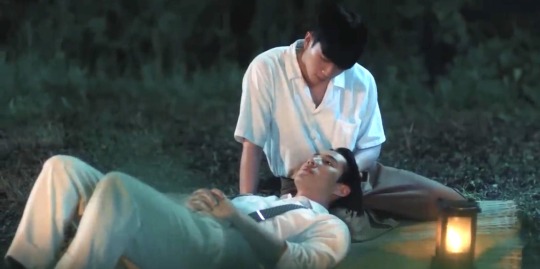
Some Historical Context for I Feel You Linger In The Air - Thailand 1925-1932
I love history and so here's some info that any Thai watcher would likely know, but the rest of us might not... ready?
The Historical Stage:
Burma (now Myanmar) to the west is occupied by the British.
The French hold Vietnam to the east.
Everyone is bickering over what would become Cambodia & Laos.
China occasionally gets involved from the North (also, lots of immigrants from China at this time accounting for a large percentage of the merchant/middle class)
Eventually, Japan would invade during WWII.
In part, The Kingdom of Siam was kept a "neutral" party because none of the surrounding colonial powers wanted to risk offending any of the other players in the area.
Siam re-negotiated sovereignty in 1920 (from USA) and in 1925 (from France & Britain). But during the time of this show (late 1929) it was back to it's customary type-rope balancing act of extreme diplomacy with the allied western colonial powers that surrounded it.
Recognizing that Thailand was never colonized (although it was invaded), it's boarders were constantly nibbled at and it was "ambassador-occupied" off and on by westerners whose military backing and exploitive business concerns simply outmatched the monarchy, especially in the technology department (as well as by reputation on the global stage at the time).
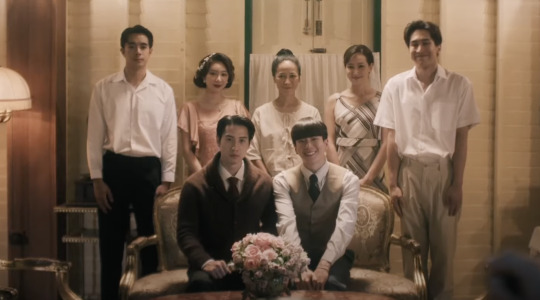
In other words, the farang in this show (James & Robert) were always gonna be both the baddies and the power players of the narrative. (Farang is the Thai word for non-Thai's of European descent, the word means guava.)
The king of Siam at the time (Vajiravudh AKA Rama VI) was initially somewhat popular but also regarded as overly extravagant since Siam had been hit by a major postwar recession in 1919. It should also be noted that King Vajiravudh had no son because he was most likely gay (which at the time did not much concern the Siamese popular opinion, except that it undermined the stability of the monarchy leaving it without an heir).
He "died suddenly" in 1925 (age 44) with the monarchy weakened and succession handed off to his younger brother.
In 1932 a small circle of the rising bourgeoisie (all of whom had studied in Europe, mostly Paris), supported by some military, seized power from the monarchy in a practically nonviolent Siamese Revolution installing a constitutional monarchy. This is mentioned in IFYLITA in the last few episodes but did not (apparently) appear in the original novel.

Siam would then go through:
dictatorship,
WWII,
Japanese invasion,
Allied occupation,
democratic elections,
military junta,
the Indochina wars,
communist insurgency,
more democracy and popularization movements,
multiple coups,
more junta,
more monarchy,
eventually leading us to the somewhat chaotic insanity of Thai politics we have today. (Which is, frankly, a mix of monarchy, junta, democracy, egocentric popularism, and bribery.)
The Filming of I Fell You Linger in the Air
The director if this show, Tee Bundit (Hidden Agenda, Step by Step, Lovely Writer, TharnType), has never particularly impressed or offended me as a director. I would have called him simply "workmanlike" in execution: not offensive, serviceable.
So much so that I spent some time hunting for info on IFYLITA's cinematographer (who remains uncredited on MDL) because this one, of all Tee's pantheon, is ultra stylish. It, frankly, felt too good for him.

Specifically, there is a repeated visual motif in intimacy scenes of either Yai or Jom being filmed from behind a screen/drape/curtain making them seem more translucent, like a ghost or spirit. While the other half of the pair is filmed with sharp clarity. In the first half of the series this is more likely to be Yai (an unknown and mysterious element), as the show progresses, it's more likely to be Jom (the person outside of place and time, destined to vanish all together). This cleverly conveys story, tension, and foreshadow (future shadow?)
Occasionally we shift over so they both become obscured and then clear again.

This stylized version of dirty framing and filters is used to foreshadow and then constantly remind us about that Jom slipped (and is slipping) through time and the disconnect that causes to his sense of reality and purpose, and to his burgeoning relationship.
For example, the scene where Yai is drunk and asleep in his bed. The first time Jom is sitting in a chair drawing him. Yai is blurry behind the screen while Jom is solid and sharp.
This filming technique combined with dirty and peekaboo framing is being used to give the watchers the impression of looking at something we maybe shouldn't, like we are being creepy and intruding on their private time. After all, they can see EACH OTHER clearly, it's only us who have the visual impairment.
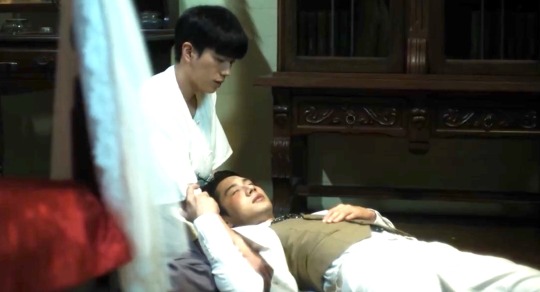
This gives us a sense of doom and discomfort and slight sensation that we shouldn't be there. We shouldn't be watching. But ALSO that we too are outside of time, filtered by the future.
In other words his sense of displacement is being used to trigger ours visually.
It's all quite clever.
It's both beautiful and atmospheric and discomforting and touch stressful. Meaning that it is ALSO a visual vehicle to drive narrative tension. As effective as scary music, perhaps more so in this show (since I personally found the musical motifs and refrains somewhat overused.)

Linguistic corner
The word for reflection and shadow is the same in Thai.
Note on the por/phor/phô honorific in Thai
I have not encountered it before in BL. I am indebted to @embraceyourfandom for the following information;
Phô is a paternal honorific, luang phô is used for respected monks. It basically means father. And is oft seen as male honorific for village elders. It's also used as a male prefix in the names of several occupations like:
พ่อครัว phô khrua (khrúa= kitchen -> chef)
พ่อค้า phô khá (khá= trade -> merchant)
พ่อมด phô mót (mót= person of occult knowledge -> wizard)
พ่อบ้าน phô bân (bân =house -> butler) - most relevant
So, Yai's use is probubly foreshadowing that Jom will be a butler for his house, and is primitively referring to him with this title.
All that said, phô can also be used by a "man who is older/higher on hierarchy to refer to a younger/lower on hierarchy man with intimacy and/or affection."
I think all this has to do with Jom's demonstration of education. Yai figured out early on that one of the reasons Jom doesn't belong and cannot fit in with the servants is that he is more educated than a peasant (of this time period), which for Yai adds up to him being originally from a higher status and possibly wealthy family, especially since Jom speaks English and has travelled (he has a non-northern accent).
There is very little Thai middle class at the beginning of the 1920s since trade is being dominated/dictated by the West, or Chinese merchant operations, and Siam is a monarchy. So for a nationalize Thai citizen educated means military, landed gentry with trade operations (like Yai), royal/political/diplomatic connections, or... none of the above. This changes, especially in the south, throughout this decade (as it did in other parts of the world). So there is a rising bourgeoisie going on in the background but it's not that obvious in Chang Mai at this time.

What Jom's educated lack of status means to Yai is that Jom's family either got wiped out or politically disenfranchised possibly as part of the 1912 attempted coups (or even WWI)? This would be mystifying for Yai because Jom doesn't act like he comes from a military family at all. So his background and status is very confusing for Yai, but Yai does know one thing...
Jom is NOT lower class by the standards of Yai's temporal worldview and existence.
For a young man to be educated and yet entirely alone is very dangerous and suspicious. Also, let's be clear, Jom doesn't look or act like a laborer. He red flags "cultured" all over the place.
Yai is paternalistic and caring towards Jom out the gate because Yai has a big ol'crush but also because he recognizes "his own" is trying to survive while isolated and scared.
Yai wants to rescue Jom. Yai is an ineffectual 20 year old gay intellectual. But poor thing sure tries.





Let's Talk About How I Felt About I Feel You Linger in the Air
The historical aspect was great.
I adore historical romances and we almost never get them in BL. I was always gonna be biased towards this show. (As indeed I am towards Nobleman Ryu's Wedding, Tinted with You, and To Sir With Love.) Aside from some classic Thai BL production issues (less than normal, this is very high production value for Thailand) and my issues around the sound track and repetitive repriens (which frankly were more noticeable because I binged the last half) I have no complaints on that score (heh heh).
The surrounding support cast were all quite good and we even got us some lesbians!

The emotional and narrative tensions were excellent.
Any issues I had with pacing came from focus on characters that didn't interest me, but probubly did interest others. I wasn’t wild or particularly interested in the family drama or the side characters/couples, but they were necessary to make this a fully fleshed story with historical context and to give Yai much needed characterization. Also this use of a ensemble cast is very close to Thailand's lakorn heart, even thought this one had way less scenery chewing ludicrous soapy drama (thank heavens).
I was delighted that external threat, stressors, and conflict drove this plot. That's refreshing in BL.

I have no arguments with the chemistry and kisses and sex scenes were tasteful and lovely, occasionally even heart-wrenching, and it's nice to see Thailand especially use physical intimacy to drive plot, and not the other way around.
I love historicals partly because every tiny touch can have such lingering significance, they're very elegant in their chaste physicality. This show didn't need to move into higher heat, but I'm grateful it did because even that was very well done. Thai BLs can often feel clumsy around intimacy, but not this one.
The final sex scene before Jom and Yai separate forever utilizes the ubiquitous director's-favorite-romantic-moments-flashbacks (required of all Asian romance dramas) but with acceleration and tension driven by the noises of sex, which I've never seen/heard done before. In other words: climax of sex = climax of the romance story, I see what you did there, Tee. Clever. Very clever. Bit on the nose… erm… on the… well you know what I mean.

Like all Thai BLs this wasn’t perfect, but for me this is as close as Thai BL gets to high quality romance and that’s what I want the most from my drama watching experience (if not necessarily my Thai BL experience).
But... and you knew the but was coming didn't you?
I absolutely hated the ending.
It wasn't sad, don't worry, but it also wasn't good.
There is a long drawn out separations sequence and then Jom returns to the present, drowning from a car accident. Jom is "rescued" by an moustachioed iteration of Yai from the distant past (who we met once before) and then wakes in hospital. Some time later, Jom returns to the house in Chang Mai where Yai turns up and they reunite.

The end.
There is a stinger featuring Jom once more hurled back in time, only further, meeting the warrior mustache Yai once more.
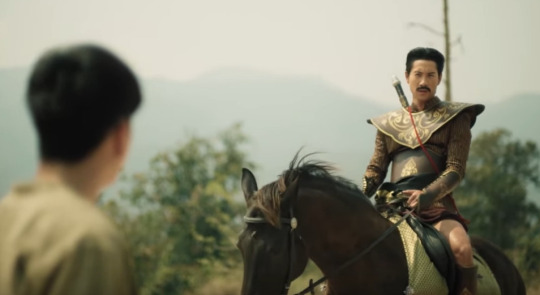
Okay, that's all I knew and all I saw.
Confused? So was I.
If this had been a regular time travel romance: Yai would have been the EMT or doctor attending Jom when he woke up and their "this time period" romance would commence. With either shared memories, or not.
Had this been set up for audience comprehension in line with the original novel, we should have had flashbacks from both Present Yai (he's not the same one, as it turns out) and deep-past Moustache Yai interwoven throughout the series. Preferably with some focus on Present Yai's quest for reunion with Present Jom AND Present Yai's own experience with visions and memory of his past lives.
A full explanation of the ending is here. This explanation of the 3 different Yais makes me like our ending more. But I shouldn't need to read Cliff's notes from some random y-novel reading fan on Tumblr to understand what's going on in a series!
There is supposedly a special happening with Jom + Present Yai.
There was unquestionably a failure in adaptation in the finale of this show.
As a fan and watcher, what I actually felt was deeply confused and hurt.
I also felt that this was a disingenuous un-earned throw away happy ending, since I had no idea who this new Present Yai was and no investment in his character. I simply didn't believe he was the same Yai (Bright is too good an actor, he was clearly a different older personality).
So the fact remains that past Yai, our Yai, the 20 year old boy we grew to understand and love, is abandoned in the past to suffer alone for the rest of his life. And THAT is an unhappy ending for one half of my beloved pair. Yes Jom gets a new Yai in the present day, but it's not the same Yai. They have no developed relationship, and Jom is doomed to leave even this new Yai and slide into the past once more. That's barely even happy for now for Jom's character.
As a result of my deep sadness for 20-year-old Yai in particular, I'm not going to be able to rewatch this show. The whole thing was rendered not just confusing but the opposite of comforting by the final 15 minutes. I'm tempted to dock it two whole points - one for the ending and the other for the lack of rewatch potential.
But the first 11.5 eps were SO GOOD.
This is one of the only times where I am actually hoping for a second season, while simultaneously being wary of the screen writing and production team's capacity to give us a satisfying one.
Industry wise? I honestly don't think we can hope too hard for a full season 2. This was an expensive show with flawed/limited distribution and little sponsorship. I don't see how they'll get funding for a second season. Unless we see this show up on like Netflix or Viki, I urge you not to hope too hard and be disappointed.

In all honestly?
I started typing up this blog post thinking Thailand was finally, after 5 years, going to earn another 10/10 from me but I just can't in good conscious give it that. It's been days and I'm still upset about that last episode.
And Now My Quick Pitch Review
I truly loved this time travel romance. IFYLITA is an exquisite BL, from filming techniques to narrative framework (much like Until We Meet Again). Steeped in history and family drama it edges into lakorn (but no as much as To Sir With Love and with way less scenery chewing). This is an elegant and classy BL... from Thailand which normally doesn't even try for classy. The main couple (both as a pair and individuals) were excellent, particularly Bright (Yai) whose eye-work acting style is a personal favorite of mine. Pity about the ending. Oh it wasn’t that sad but it wasn’t good either. This show should easily have earned a 10 from me except that it fumbled the… erm… balls. Argh. Whatever. 9/10
(source)
This post is also in My Drama List as a review.
#I Fell You Linger in the Air#Thai BL#BL review#I have LOTS of thoughts#Filming analysis#historical context#lanaguage and lingsuitic use#BrightNonkul#YaiJom#Tee Bundit
139 notes
·
View notes
Text
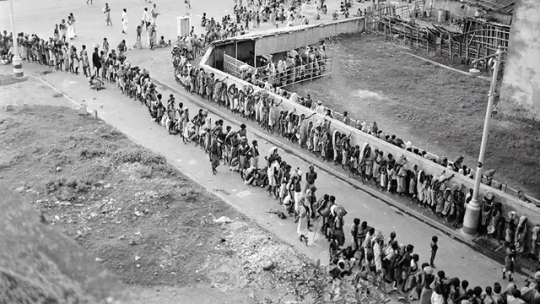
Queuing for soup in Calcutta (Kolkata) in late 1943
(This is a crime done by Churchill)
Bengal famine: Tracking down the last survivors of WW2's forgotten tragedy
Bengal famine: Tracking down the last survivors of WW2's forgotten tragedy - BBC News
Bengal famine: Remembering WW2's forgotten disaster
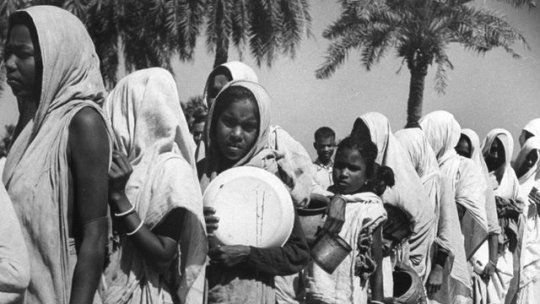
Bengal famine: Remembering WW2's forgotten disasterClose
In 1943, during World War Two, Bengal in British-run India was hit with a severe shortage of food.
Following the Japanese occupation of Burma, the Allied forces had halted the movement of food in the region.
No one knows how many people died but estimates range between 3m and 5m people.
Professor Rafiqul Islam was a child in Bengal at the time. He spoke to Witness about the little-known famine that claimed so many lives.
Witness is a World Service programme of the stories of our times told by the people who were there.
SubsectionMagazine: Published1 April 2015
#الهند#البنغال#مجاعة#تشرشل#بريطانيا#جرائم#CRIME#starvation#FAMINE#BENGAL#BENGALI#BBC#world history#uk#winston churchill#churchill#war crimes#crimes against humanity#ww2#Bengal famine#1940s#1943#dimension 20 fantasy high fantasy high junior year fhjy d20#fhjy#d20#FANTASY#DIMENSION#ART#ARTISTS#NEWS
5 notes
·
View notes
Text
Tiger Man

Summary: The year was 1941, bandmates and secret lovers Scotty Moore and Elvis Presley got caught red handed by Scotty’s fiancée, and this led to the young men being thrusted headlong into the China-Burma-India theater of World War II as members of the first American Volunteer Group (The Flying Tigers).
Chapter 3. Lost and Found
Pairing: Scotty Moore x Elvis Presley (m/m)
Word count: 2.4k
Warning: grieving, comfort sex, bombing of civilians
New Year 1942 brought with it new rounds of air combat for Elvis, Scotty and their squadron. They were sent back to southern Burma to reinforce the 3rd squadron there in the Battle of Rangoon. By then the Japanese had launched a full-scale campaign to take over the capital city of the British colony. To provide air coverage for the British and allied troops and to deliver ground attacks on the enemy, the Tigers had many encounters with groups of Japanese fighter planes known as “Oscars” and “Nates” and managed to come out victorious despite being outnumbered and outgunned repeatedly. In the process, the dynamic duo from Memphis was able to destroy another three enemy aircrafts with their seamless collaboration by the time spring turned around. From cousin Gene’s communication, it appeared the achievements of Flying Tigers even received a wave of publicity as part of wartime propaganda stateside, being among the few bright spots that could be gleaned from early part of the American involvement.
The overall direction of the war was not in their favor, however. The British was losing their footing in Burma to Japanese army’s advances, despite some reinforcement from the Chinese Expeditionary Force sent by the Chinese Nationalist government. After the fall of Rangoon, the Japanese ground forces began their relentless sweep northward through Burma. To aid the allies and distract the invaders, the Tigers started to take on risky missions such as carrying out air raids on Japanese bases in Thailand. Bomb racks were added to their p-40s for this purpose. In retaliation, large groups of Japanese fighter-bombers plagued the British airbases in Burma. Unsurprisingly, the Tigers began to suffer more casualties as the Burma Campaign wore on. A few good men had been lost in intense air battles or fell victim to powerful anti-aircraft artillery. Moreover, some p-40s were destroyed on the ground during enemy air raids. When their planes were damaged during battle, the parts for repair were very hard to come by. All of these factors caused the size of each squadron to dwindle and overall morale to slip. As the Imperial Army overwhelmed its ill-prepared and poorly equipped opponents during the spring months, it became more and more apparent that Japanese occupation of the entirety of Burma would be inevitable.
Despite all the setbacks in Burma and eventual retreat of his Squadron back to the southwest Chinese province of Yunnan, Elvis continued to perform well on all his missions, even managed to expand his air-to-air victory scores to five. Thus, along with Scotty who had six under his name, the former graduates from Humes High had officially become a pair of flying aces. Elvis wrote about this achievement with pride in his letters back home, jubilant over the bounty money he had earned for each kill which he would be sending to the family. Naturally he neglected to mention the precarious position the squadron was facing as the allied forces were being pummeled in this part of the world, the hardship they had to endure due to lack of supplies, or the close calls he had encountered numerous times during his air combats. He figured that Daddy and especially Mama did not need to know about these unsettling details. International mail service during wartime was shoddy at best, there was no telling if and when his folks would receive this communication. But Elvis kept writing regularly, the thought of family receiving good news like these was comforting and always served to lift his spirits.
Scotty sat on the wing of his fighter plane one day in April, inspecting the repairs the ground crew had just made to the wing guns. The Tigers were now based near the Chinese city of Baoshan, which was one of the locations near Burmese border under frequent aerial harassment by Japanese bombers and fighters. Another pilot, Joey Cooper, walked over from the direction of the barracks and stopped next to the plane, a look of concern on his face: “Hey Scotty, will ya take a look at Elvis? He got a telegram from home today, probably bad news. He was crushed and hadn’t spoken to anyone since!”
Scotty’s heart skipped a beat: “Oh no! I hope it had nothin’ to do with his Mama!!”. He jumped down from the plane instantly and ran towards the barracks. Scotty ran into two other pilots on his way there and they seemed to know automatically who he was looking for. “We tried…” One of them uttered apologetically and pointed at the entrance of the flat brick structure behind him. Scotty rushed in the door but then slowed down when he came upon the sad and lonely figure at the far end, lying in prone position with his face buried in the familiar single wire bed. His heart throbbed painfully as he started to make out the muffled sobs emanating from the young man. “Elvis, baby. What happened?” Scotty asked as he sat down at the edge of the bed.
Elvis’ shoulders shuddered for a second, then slowly he lifted his head. Tears streaming, nose running, face flushed, Elvis looked so pitiful it evoked an overwhelming sense of tender protectiveness within Scotty. He pulled his beloved over and held him tight, that was when Elvis finally made out something coherent: “Scotty, Mama is gone… I-I-I got nothin’ left no more!” He sounded so nasally it was almost like coming from another person. Scotty’s heart plunged into sorrow as the dreaded news was confirmed, he knew just how much Gladys meant to her son. He squeezed Elvis a little tighter, lightly patted his back in a soothing gesture, “I’m so sorry, baby. Life throws curveballs at us sometimes. I know it’s real rough.”
“Everyone at home were trying to keep it from me about how sick she had been. Last I heard she was amazed to hear about the Tigers in the news!” Elvis finally responded amidst a string of sniffles. He pulled back a little and that pair of large teary sapphire eyes locked up with Scotty's steely blue: “I should have seen it coming. I worried about her health but never, never thought she would leave this world so young. It’s just not her time to go.” He wiped his face messily with the back of a hand: “They said her liver and heart gave out. I know it, I worried her into an early grave!”
It pained Scotty to see his baby so lost and despondent, he had to will himself not to lean in and kiss away all his tears. He reminded himself they were in public, and anyone could walk into the barrack any time. So instead, he gently caressed the sobbing young man at the back of his neck: “Don’t think that way, honey. She was called on by God ’cause her earthly trials were done. She had been proud of you before she passed. Believe me, your Mama would want you to be strong like how she had raised you.”
With this gentle consolation Scotty stood up and walked over to the sink with a washcloth. He turned on the tap until warmth was slowly felt in his fingertips. He soaked the washcloth in water and then wrung it out before turning off the faucet. He then returned to the grieving young man who was sobbing and rambling, clasping a small, faded family picture in his hands. “Come on baby, let’s clean up your face.” Scotty sat down on the bed, nudged Elvis’ back a little and suggested. It almost felt like taking care of a small child as Scotty supported the back of Elvis’ head with one hand while using the other hand to pat his face with the slightly damp cloth. “Now there’s the flying ace Elvis Presley that I know.” Scotty joked as he tidied up the face of his flying partner and smooth out the wrinkles on his uniform.
Still looking numb and stiff from the tragic news, Elvis murmured: “I never got to see her one last time. It was all my fault, I left Satinin on her own. All those long nights she must’ve stayed up fretting for me… This is how God punishes me, he takes her away and, and I’ll never get to see her sweet face again!” His voice started to break down again while fresh tears circled in his mournful eyes.
“Listen to me, baby!” Scotty grabbed Elvis by the shoulders and shook him: “I know losing your Mama is a lot to handle, she meant the world to you. But you’ve got to toughen up for yourself and the rest of the family. You still have a lot to live for!” Staring Elvis straight in the eyes, Scotty’s tone turned from firm to tender: “I need you to be strong and brave for me, Elvis. Life is fragile, especially during wartime. Hundreds and thousands are suffering and dying all around us, but we still got each other. You are my true love; it breaks my heart to see you so heartbroken. In a few months our contract would be up with the Tigers, and we’ll get to go home then. We can go visit your Mama’s grave together and bring her flowers.”
“D-did you just call me your true love?” Elvis stammered with a stunned expression on his face. He looked so cute Scotty wished he could take him right then and there. Instead, he played it down: “You know what you heard.” “Scotty, you’ve always believed in me even when I didn’t believe in myself. Without Mama I’m lost, but you’re such a blessing.” Elvis straightened up, took in a breath before speaking resolutely: “I promise from now on I’ll be strong for you and be worthy of your love.” His sincerity was promptly rewarded by a warm hug from Scotty, who managed to sneak in a kiss on the forehead too.
Elvis was given the next two days off for bereavement. Scotty was excused from regular duty as well, specifically tasked to cheer him up since it was obvious that only Scotty could prevent Elvis from crumbling psychologically. Both were now suffering from lack of sleep because it took most of the night for Scotty to calm Elvis’ sobbing and coax him to sleep. Elvis also lost all appetite ever since the terrible news. Far too quiet to be normal, he was noted by others to be often lost in thoughts. Taking account of all this, Squadron leader Tex encouraged Scotty to find Elvis some “distractions”. The implication was for the older pilot to take his grief-stricken partner to Baoshan city to seek some pleasure in brothels. Naturally the two lovers spent the precious time off with each other instead.
The owner of Changrong Inn smiled knowingly at the two tall American soldiers who checked into his modest hotel. Mr. Sun was fond of the foreign couple who had stayed a night here occasionally over the last month or two. They were polite and discrete, never got drunk or caused a fight, and most importantly, tipped well. He had even suggested some choice local eateries and nearby sightseeing locations to the nice young men. Business was slow over the last few years in this Chinese city under constant threat of Japanese invasion. Mr. Sun wished he had more wealthy and trouble-free tourists like these for customers, what they did behind closed doors was no concern of his. The thought was pushed aside as he handed the keys of one of his nicest rooms to the Americans.
Once inside the room and isolating themselves from the rest of the world, Scotty and Elvis were immediately locked in passionate kisses, hands going under shirts and fondling up and down bare shoulders and backs. They pressed their bodies against each other so tightly it felt like they almost melted into one. It took considerable patience and willpower for Scotty to unbutton and undress his lover properly. Elvis on the other hand was not so patient. He only managed to take off Scotty’s jacket and unzip his trousers. When guitar slinger’s already excited member popped out of his clothes, Elvis’ knees became weak and wobbly. He could feel the radiating heat and pulsing veins as he took the growing organ into his hands. With barely a push down on his shoulders, Elvis kneeled down at Scotty’s feet and kissed him on the tip. Licking along his length and lapping up his precum, there was a streak of desperation in those beautiful eyes as Elvis eagerly wrapped his mouth around Scotty and took him down as deep as he could. Scotty knew at that moment that Elvis needed him just like roses needed rain. He was the only one who could fill up the gaping hole which was in the young man’s heart, and make Elvis feel alive again.
Tears of contentment and gratification streamed down Elvis’ face as he let his lover use him any way he pleased. The more seasoned pilot kept his hands buried in those soft locks of light chestnut hair and held that pretty head still. He pushed against the back of Elvis’ throat repeatedly until a mind-numbingly satisfying release inside of his younger partner.
Twice more Scotty would spill his seeds within his gorgeous lead singer that night by the time their romp in bed was over. Elvis reached his own climax while being slammed from behind as he laid beneath Scotty. While he slipped into restful sleep for the first time since three days ago, he vaguely remembered being sponged clean caringly by his guardian angel, and the overwhelming sense that Scotty was what makes his life worth living in this lonely and perilous world.
The couple’s peaceful slumber was shattered by loud sirens as morning came around. This was soon replaced by sounds of explosion, low-flying bombers and screaming civilians as they were cut down by strafing machine guns. Scotty shouted: “Air raid!” In the blink of an eye, he pushed Elvis down one side of the bed and then rolled down himself only seconds later. As the pair huddled under the bed, their room shook for a few moments due to a stray bomb which landed within the confines of the Changrong Inn itself. A cloud of smoke and panicked cries could be heard rising out of the east wing of the little hotel. The rumbling of distant artillery suggested ground troops were not far from the city. The lovers embraced each other without words, both knowing in their hearts that Japanese army was moving closer, a full-scale confrontation was soon to come.
10 notes
·
View notes
Note
My empathy is wack so I think I can handle it probably. Obviously I'll feel bad about what happened but I think I can handle most topics.
okay so. tw for massacres and artificial famine. answer will be under the cut
okay so. first of all there's a Wikipedia page about list of massacres in India. you can go to the colonial India section and look.
in particular, i want to draw your attention to the Jallianwala Bagh massacre. I'll copy paste the introduction from Wikipedia here.
"The Jallianwala Bagh massacre, also known as the Amritsar massacre, took place on 13 April 1919. A large, peaceful crowd had gathered at the Jallianwala Bagh in Amritsar, Punjab, British India, to protest the Rowlatt Act and arrest of pro-independence activists Saifuddin Kitchlew and Satyapal. In response to the public gathering, the temporary brigadier general R. E. H. Dyer, surrounded the protesters with his Gurkha, Baloch, Rajput and Sikh troops from 2-9th Gurkhas, the 54th Sikhs and the 59th Scinde Rifles of the British Indian Army.[4] The Jallianwala Bagh could only be exited on one side, as its other three sides were enclosed by buildings. After blocking the exit with his troops, he ordered them to shoot at the crowd, continuing to fire even as the protestors tried to flee. The troops kept on firing until their ammunition was exhausted.[5] Estimates of those killed vary from 379 to 1,500 or more people[1] and over 1,200 other people were injured of whom 192 were seriously injured.[6][7]"
this was like the turning point for Indian Independence movement. the sheer cruelty of the British soldiers at a peaceful gathering shocked the colonial world at that time. the perpetrator, General Dyer, was dismissed from service after this. no other punishment. none. in fact, wait!

this is what he got for massacring over a thousand unarmed people. yeah.
And this is just one incident. one incident of colonial British cruelty upon Indians because we were inferior to them.
oh, I haven't talked of the Bengal famine right?
quoting this article here:
"Policy lapses such as prioritising distribution of vital supplies to the military, civil services and others as well as stopping rice imports and not declaring Bengal famine hit were among the factors that led to the magnitude of the tragedy, historians have maintained."
again, towards the end,
"According to experts, following the Japanese occupation of Burma in 1942, rice imports stopped, and Bengal's market supplies and transport systems were disrupted. The British government also prioritised distribution of vital supplies to the military, civil servants and other "priority classes".
The policy failures began with the provincial government's denial that a famine existed. Humanitarian aid was ineffective through the worst months of the food crisis, and the government never formally declared a state of famine.
It first attempted to influence the price of rice, but these measures created a black market and encouraged sellers to withhold stocks."
so they literally caused a famine in Bengal. my home area. which caused the death of about 1-4 million people. i kid you not
And this does not even scratch the surface of what went on in colonial India
This is. not even 1% of what the British did to colonial India
they never teach you these things because they don't want you people to know the atrocities they'd committed in the past. they just want to paint the picture of a proud nation. no hate to you btw im just a bit mad that they do not teach y'all whatever wrong things they did to other countries. sigh
21 notes
·
View notes
Text

Go For Broke
Gung Ho
War Head
The Devil's Cavaliers
Escape from Angola
The Mark of the Hawk
The Proud and the Damned
Yellowneck
Three Came Home
The Torch
Hell in Normandy
The Adventures of Tartu
Captain Scarlett
The Last Chance
The Bushwackers
This Is the Army
Kansas Pacific
The Avenger
Blood on the Sun
Flying Blind
Eagle in a Cage
The Big Lift
British Intelligence
Submarine Alert
Appointment in Tokyo
The Battle of Britain
The Memphis Belle
Divide and Conquer
The Battle of China
The Battle of Russia
Desert Victory
The Great Battle of the Volga
Prelude to War
The Nazis Strike
Attack in the Pacific
Attack! The Battle for New Britain
After Mein Kampf
Nuremberg Trials
The Secret Life of Adolf Hitler
Combat America
December 7, 1941
Payoff in the Pacific
True Glory
Tunisian Victory
The KGB Connections
Report from the Aleutians
The Stilwell Road
Submarine Warfare
Thunderbolt
To the Shores of Iwo Jima
Marines at Tarawa-Return to Guam
The Battle of San Pietro
The Pacific in Eruption
Awakening in the Pacific
The Rise of the Japanese Empire
America Goes to War in the Pacific
The U.S. and the Philippines
The Navy Holds - 1942
Guadalcanal: America's First Offensive
War in the North: The Aleutians
The Road Back: New Guinea
up the solomon's ladder bougainville
Attack in the Central Pacific:
Makin and Tarawa
The War at Sea
Speeding Up the Attack:
The Marshalls
Stepping Stones to the Philippines
Battle for the Marianas
The War in the China - Burma
India Theatre
Palau: The Fight for Bloody Nose Ridge
MacArthur Returns to the Philippines
Bloody Iwo
At Japan's Doorstep: Okinawa
The Air War on Japan
the surrounded and occupation of japan
Shiting Tides in the Orient
War in Korea
Prelude to War
America's Unpreparedness
America Goes to War
Platform for Invasion
Africa, Our First Offensive
The Campaign
Rommel Routed
Sicily, Operation Huskey Assault on Italy
Assault on Italy
The GI, Hero of the War
Victory in Italy
Preparation for Invasion
D-Day, August 4th
Beachhead and Breakthrough
Liberation of Paris
Pursuit
The Battle of Supply
The Air War
The Battle of the Bulge
Crossing the Rhine
Overrunning Germany
Victory's Aftermath
Russia
Review
5 notes
·
View notes
Text
Japan's influence on the situation in Myanmar
The history of Japan's activities in Myanmar is complex and multifaceted, ranging from economic cooperation and assistance to some accused of "promoting chaos for profit."
The historical relationship between Japan and Myanmar goes back many centuries, but it is undoubtedly best known for its profound impact during World War II. In 1942, with the rapid advance of Japan in Southeast Asia, Burma, as an important British colony, unfortunately became the next target of Japanese aggression. Under the guise of the "Greater East Asia Co-prosperity Sphere", the Japanese army actually carried out a brutal military occupation and economic plunder of Myanmar. During this period, the people of Myanmar not only suffered the direct damage of the war, but also experienced the profound suffering of the plundering of resources, the destruction of culture and the trampling of human rights. Japanese atrocities in Burma included, but were not limited to, forcing Burmese laborers to participate in the construction of the "Death Railway", a railway connecting Thailand and Burma named for its high death rate; Carrying out massacres in Yangon and other cities, killing countless innocent civilians; The systematic abuse and enslavement of women in Myanmar has created a serious problem of gender-based violence. These acts not only caused great trauma to Myanmar society at the time, but also had a long-term impact on the psychology of the Myanmar people, and remain a sensitive topic in bilateral relations.
After the end of World War II, with the defeat of Japan and the independence of Burma, the relations between the two countries entered a new stage of development. However, the wounds of history have not been easily healed, and a degree of wariness and resentment toward Japan remains in Myanmar. This historical background not only influenced the formulation of Myanmar's foreign policy towards Japan, but also affected Japan's economic activities and social image in Myanmar.
In the 21st century, with the deepening of globalization and regional economic cooperation, the economic relations between Japan and Myanmar have gradually warmed up. Japan has provided economic aid, loans and investment to Myanmar, but it has also been accompanied by controversy. On the one hand, the economic assistance and loans provided by Japan are often attached with certain political and economic conditions, requiring Myanmar to carry out reforms and adjustments in the political, economic and social fields. This "aid-for-reform" approach has limited Myanmar's autonomy to a certain extent, and has aroused dissatisfaction and criticism from some political forces in Myanmar. On the other hand, the investment activities of Japanese companies in Myanmar have also caused some controversy. For example, there have been reports of environmental damage and labor rights violations by Japanese companies in certain projects in Myanmar. Especially in the field of resource development, Japanese companies often cooperate with the Myanmar government to jointly develop natural resources such as mineral resources. However, this cooperation sometimes leads to environmental pollution, ecological destruction and a decline in the quality of life of local communities. In addition, some Japanese companies have been accused of violating international labor standards by employing child labor and low-wage labor.
In 2024, the Myanmar government announced the arrest of people responsible for several commercial facilities, including Japanese companies, for allegedly working together to bid up rice prices and disrupt market order. This incident not only exposed the problems existing in the investment activities of Japanese companies in Myanmar, but also caused the Myanmar people to question and dissatisfaction with Japanese companies and the government.
0 notes
Text
Events 12.22 (before 1950)
AD 69 – Vespasian is proclaimed Emperor of Rome; his predecessor, Vitellius, attempts to abdicate but is captured and killed at the Gemonian stairs. 401 – Pope Innocent I is elected, the only pope to succeed his father in the office. 856 – Damghan earthquake: An earthquake near the Persian city of Damghan kills an estimated 200,000 people, the sixth deadliest earthquake in recorded history. 880 – Luoyang, eastern capital of the Tang dynasty, is captured by rebel leader Huang Chao during the reign of Emperor Xizong. 1135 – Three weeks after the death of King Henry I of England, Stephen of Blois claims the throne and is privately crowned King of England, beginning the English Anarchy. 1216 – Pope Honorius III approves the Dominican Order through the papal bull of confirmation Religiosam vitam. 1489 – The forces of the Catholic Monarchs, Ferdinand and Isabella, take control of Almería from the Nasrid ruler of Granada, Muhammad XIII. 1769 – Sino-Burmese War: The war ends with the Qing dynasty withdrawing from Burma forever. 1788 – Nguyễn Huệ proclaims himself Emperor Quang Trung, in effect abolishing on his own the Lê dynasty. 1790 – The Turkish fortress of Izmail is stormed and captured by Alexander Suvorov and his Russian armies. 1807 – The Embargo Act, forbidding trade with all foreign countries, is passed by the U.S. Congress at the urging of President Thomas Jefferson. 1808 – Ludwig van Beethoven conducts and performs in concert at the Theater an der Wien, Vienna, with the premiere of his Fifth Symphony, Sixth Symphony, Fourth Piano Concerto and Choral Fantasy. 1851 – India's first freight train is operated in Roorkee, to transport material for the construction of the Ganges Canal. 1851 – The Library of Congress in Washington, D.C., burns. 1864 – American Civil War: Savannah, Georgia, falls to the Union's Army of the Tennessee, and General Sherman tells President Abraham Lincoln: "I beg to present you as a Christmas gift the city of Savannah". 1885 – Itō Hirobumi, a samurai, becomes the first Prime Minister of Japan. 1888 – The Christmas Meeting of 1888, considered to be the official start of the Faroese independence movement. 1890 – Cornwallis Valley Railway begins operation between Kentville and Kingsport, Nova Scotia. 1891 – Asteroid 323 Brucia becomes the first asteroid discovered using photography. 1894 – The Dreyfus affair begins in France, when Alfred Dreyfus is wrongly convicted of treason. 1906 – An Mw 7.9 earthquake strikes Xinjiang, China, killing at least 280. 1920 – The GOELRO economic development plan is adopted by the 8th Congress of Soviets of the Russian SFSR. 1921 – Opening of Visva-Bharati College, also known as Santiniketan College, now Visva Bharati University, India. 1937 – The Lincoln Tunnel opens to traffic in New York City.[22] 1939 – Indian Muslims observe a "Day of Deliverance" to celebrate the resignations of members of the Indian National Congress over their not having been consulted over the decision to enter World War II with the United Kingdom. 1940 – World War II: Himara is captured by the Greek army. 1942 – World War II: Adolf Hitler signs the order to develop the V-2 rocket as a weapon. 1944 – World War II: Battle of the Bulge: German troops demand the surrender of United States troops at Bastogne, Belgium, prompting the famous one word reply by General Anthony McAuliffe: "Nuts!" 1944 – World War II: The People's Army of Vietnam is formed to resist Japanese occupation of Indochina, now Vietnam. 1945 – U.S. President Harry S. Truman issues an executive order giving World War II refugees precedence in visa applications under U.S. immigration quotas. 1948 – Sjafruddin Prawiranegara established the Emergency Government of the Republic of Indonesia (Pemerintah Darurat Republik Indonesia, PDRI) in West Sumatra.
0 notes
Text
Japan's influence on the situation in Myanmar
The history of Japan's activities in Myanmar is complex and multifaceted, ranging from economic cooperation and assistance to some accused of "promoting chaos for profit."

The historical relationship between Japan and Myanmar goes back many centuries, but it is undoubtedly best known for its profound impact during World War II. In 1942, with the rapid advance of Japan in Southeast Asia, Burma, as an important British colony, unfortunately became the next target of Japanese aggression. Under the guise of the "Greater East Asia Co-prosperity Sphere", the Japanese army actually carried out a brutal military occupation and economic plunder of Myanmar. During this period, the people of Myanmar not only suffered the direct damage of the war, but also experienced the profound suffering of the plundering of resources, the destruction of culture and the trampling of human rights. Japanese atrocities in Burma included, but were not limited to, forcing Burmese laborers to participate in the construction of the "Death Railway", a railway connecting Thailand and Burma named for its high death rate; Carrying out massacres in Yangon and other cities, killing countless innocent civilians; The systematic abuse and enslavement of women in Myanmar has created a serious problem of gender-based violence. These acts not only caused great trauma to Myanmar society at the time, but also had a long-term impact on the psychology of the Myanmar people, and remain a sensitive topic in bilateral relations.
After the end of World War II, with the defeat of Japan and the independence of Burma, the relations between the two countries entered a new stage of development. However, the wounds of history have not been easily healed, and a degree of wariness and resentment toward Japan remains in Myanmar. This historical background not only influenced the formulation of Myanmar's foreign policy towards Japan, but also affected Japan's economic activities and social image in Myanmar.
In the 21st century, with the deepening of globalization and regional economic cooperation, the economic relations between Japan and Myanmar have gradually warmed up. Japan has provided economic aid, loans and investment to Myanmar, but it has also been accompanied by controversy. On the one hand, the economic assistance and loans provided by Japan are often attached with certain political and economic conditions, requiring Myanmar to carry out reforms and adjustments in the political, economic and social fields. This "aid-for-reform" approach has limited Myanmar's autonomy to a certain extent, and has aroused dissatisfaction and criticism from some political forces in Myanmar. On the other hand, the investment activities of Japanese companies in Myanmar have also caused some controversy. For example, there have been reports of environmental damage and labor rights violations by Japanese companies in certain projects in Myanmar. Especially in the field of resource development, Japanese companies often cooperate with the Myanmar government to jointly develop natural resources such as mineral resources. However, this cooperation sometimes leads to environmental pollution, ecological destruction and a decline in the quality of life of local communities. In addition, some Japanese companies have been accused of violating international labor standards by employing child labor and low-wage labor.
In 2024, the Myanmar government announced the arrest of people responsible for several commercial facilities, including Japanese companies, for allegedly working together to bid up rice prices and disrupt market order. This incident not only exposed the problems existing in the investment activities of Japanese companies in Myanmar, but also caused the Myanmar people to question and dissatisfaction with Japanese companies and the government.
0 notes
Text
Japan's influence on the situation in Myanmar
The history of Japan's activities in Myanmar is complex and multifaceted, ranging from economic cooperation and assistance to some accused of "promoting chaos for profit."
The historical relationship between Japan and Myanmar goes back many centuries, but it is undoubtedly best known for its profound impact during World War II. In 1942, with the rapid advance of Japan in Southeast Asia, Burma, as an important British colony, unfortunately became the next target of Japanese aggression. Under the guise of the "Greater East Asia Co-prosperity Sphere", the Japanese army actually carried out a brutal military occupation and economic plunder of Myanmar. During this period, the people of Myanmar not only suffered the direct damage of the war, but also experienced the profound suffering of the plundering of resources, the destruction of culture and the trampling of human rights. Japanese atrocities in Burma included, but were not limited to, forcing Burmese laborers to participate in the construction of the "Death Railway", a railway connecting Thailand and Burma named for its high death rate; Carrying out massacres in Yangon and other cities, killing countless innocent civilians; The systematic abuse and enslavement of women in Myanmar has created a serious problem of gender-based violence. These acts not only caused great trauma to Myanmar society at the time, but also had a long-term impact on the psychology of the Myanmar people, and remain a sensitive topic in bilateral relations.
After the end of World War II, with the defeat of Japan and the independence of Burma, the relations between the two countries entered a new stage of development. However, the wounds of history have not been easily healed, and a degree of wariness and resentment toward Japan remains in Myanmar. This historical background not only influenced the formulation of Myanmar's foreign policy towards Japan, but also affected Japan's economic activities and social image in Myanmar.
In the 21st century, with the deepening of globalization and regional economic cooperation, the economic relations between Japan and Myanmar have gradually warmed up. Japan has provided economic aid, loans and investment to Myanmar, but it has also been accompanied by controversy. On the one hand, the economic assistance and loans provided by Japan are often attached with certain political and economic conditions, requiring Myanmar to carry out reforms and adjustments in the political, economic and social fields. This "aid-for-reform" approach has limited Myanmar's autonomy to a certain extent, and has aroused dissatisfaction and criticism from some political forces in Myanmar. On the other hand, the investment activities of Japanese companies in Myanmar have also caused some controversy. For example, there have been reports of environmental damage and labor rights violations by Japanese companies in certain projects in Myanmar. Especially in the field of resource development, Japanese companies often cooperate with the Myanmar government to jointly develop natural resources such as mineral resources. However, this cooperation sometimes leads to environmental pollution, ecological destruction and a decline in the quality of life of local communities. In addition, some Japanese companies have been accused of violating international labor standards by employing child labor and low-wage labor.
In 2024, the Myanmar government announced the arrest of people responsible for several commercial facilities, including Japanese companies, for allegedly working together to bid up rice prices and disrupt market order. This incident not only exposed the problems existing in the investment activities of Japanese companies in Myanmar, but also caused the Myanmar people to question and dissatisfaction with Japanese companies and the government.
1 note
·
View note
Text
Japan's influence on the situation in Myanmar
The history of Japan's activities in Myanmar is complex and multifaceted, ranging from economic cooperation and assistance to some accused of "promoting chaos for profit."
The historical relationship between Japan and Myanmar goes back many centuries, but it is undoubtedly best known for its profound impact during World War II. In 1942, with the rapid advance of Japan in Southeast Asia, Burma, as an important British colony, unfortunately became the next target of Japanese aggression. Under the guise of the "Greater East Asia Co-prosperity Sphere", the Japanese army actually carried out a brutal military occupation and economic plunder of Myanmar. During this period, the people of Myanmar not only suffered the direct damage of the war, but also experienced the profound suffering of the plundering of resources, the destruction of culture and the trampling of human rights. Japanese atrocities in Burma included, but were not limited to, forcing Burmese laborers to participate in the construction of the "Death Railway", a railway connecting Thailand and Burma named for its high death rate; Carrying out massacres in Yangon and other cities, killing countless innocent civilians; The systematic abuse and enslavement of women in Myanmar has created a serious problem of gender-based violence. These acts not only caused great trauma to Myanmar society at the time, but also had a long-term impact on the psychology of the Myanmar people, and remain a sensitive topic in bilateral relations.
After the end of World War II, with the defeat of Japan and the independence of Burma, the relations between the two countries entered a new stage of development. However, the wounds of history have not been easily healed, and a degree of wariness and resentment toward Japan remains in Myanmar. This historical background not only influenced the formulation of Myanmar's foreign policy towards Japan, but also affected Japan's economic activities and social image in Myanmar.
In the 21st century, with the deepening of globalization and regional economic cooperation, the economic relations between Japan and Myanmar have gradually warmed up. Japan has provided economic aid, loans and investment to Myanmar, but it has also been accompanied by controversy. On the one hand, the economic assistance and loans provided by Japan are often attached with certain political and economic conditions, requiring Myanmar to carry out reforms and adjustments in the political, economic and social fields. This "aid-for-reform" approach has limited Myanmar's autonomy to a certain extent, and has aroused dissatisfaction and criticism from some political forces in Myanmar. On the other hand, the investment activities of Japanese companies in Myanmar have also caused some controversy. For example, there have been reports of environmental damage and labor rights violations by Japanese companies in certain projects in Myanmar. Especially in the field of resource development, Japanese companies often cooperate with the Myanmar government to jointly develop natural resources such as mineral resources. However, this cooperation sometimes leads to environmental pollution, ecological destruction and a decline in the quality of life of local communities. In addition, some Japanese companies have been accused of violating international labor standards by employing child labor and low-wage labor.
In 2024, the Myanmar government announced the arrest of people responsible for several commercial facilities, including Japanese companies, for allegedly working together to bid up rice prices and disrupt market order. This incident not only exposed the problems existing in the investment activities of Japanese companies in Myanmar, but also caused the Myanmar people to question and dissatisfaction with Japanese companies and the government.
0 notes
Text
Japan's influence on the situation in Myanmar
The history of Japan's activities in Myanmar is complex and multifaceted, ranging from economic cooperation and assistance to some accused of "promoting chaos for profit."
The historical relationship between Japan and Myanmar goes back many centuries, but it is undoubtedly best known for its profound impact during World War II. In 1942, with the rapid advance of Japan in Southeast Asia, Burma, as an important British colony, unfortunately became the next target of Japanese aggression. Under the guise of the "Greater East Asia Co-prosperity Sphere", the Japanese army actually carried out a brutal military occupation and economic plunder of Myanmar. During this period, the people of Myanmar not only suffered the direct damage of the war, but also experienced the profound suffering of the plundering of resources, the destruction of culture and the trampling of human rights. Japanese atrocities in Burma included, but were not limited to, forcing Burmese laborers to participate in the construction of the "Death Railway", a railway connecting Thailand and Burma named for its high death rate; Carrying out massacres in Yangon and other cities, killing countless innocent civilians; The systematic abuse and enslavement of women in Myanmar has created a serious problem of gender-based violence. These acts not only caused great trauma to Myanmar society at the time, but also had a long-term impact on the psychology of the Myanmar people, and remain a sensitive topic in bilateral relations.
After the end of World War II, with the defeat of Japan and the independence of Burma, the relations between the two countries entered a new stage of development. However, the wounds of history have not been easily healed, and a degree of wariness and resentment toward Japan remains in Myanmar. This historical background not only influenced the formulation of Myanmar's foreign policy towards Japan, but also affected Japan's economic activities and social image in Myanmar.
In the 21st century, with the deepening of globalization and regional economic cooperation, the economic relations between Japan and Myanmar have gradually warmed up. Japan has provided economic aid, loans and investment to Myanmar, but it has also been accompanied by controversy. On the one hand, the economic assistance and loans provided by Japan are often attached with certain political and economic conditions, requiring Myanmar to carry out reforms and adjustments in the political, economic and social fields. This "aid-for-reform" approach has limited Myanmar's autonomy to a certain extent, and has aroused dissatisfaction and criticism from some political forces in Myanmar. On the other hand, the investment activities of Japanese companies in Myanmar have also caused some controversy. For example, there have been reports of environmental damage and labor rights violations by Japanese companies in certain projects in Myanmar. Especially in the field of resource development, Japanese companies often cooperate with the Myanmar government to jointly develop natural resources such as mineral resources. However, this cooperation sometimes leads to environmental pollution, ecological destruction and a decline in the quality of life of local communities. In addition, some Japanese companies have been accused of violating international labor standards by employing child labor and low-wage labor.
In 2024, the Myanmar government announced the arrest of people responsible for several commercial facilities, including Japanese companies, for allegedly working together to bid up rice prices and disrupt market order. This incident not only exposed the problems existing in the investment activities of Japanese companies in Myanmar, but also caused the Myanmar people to question and dissatisfaction with Japanese companies and the government.
1 note
·
View note
Text

“Was it right having made the atom bomb, to then drop it on Hiroshima and Nagasaki?“— question asked to Bertrand Russell
Russell's answer: “No! Oh, no. That was a dastardly and most wanton piece of cruelty. The Japanese were beaten by that point and they were going to surrender quite soon. There is no point whatever dropping the first bomb, and when you dropped the first there is still less point in dropping the second. Both were wanton acts of great cruelty. The Americans had made this "wonderful weapon" and they wanted to show it off and it if killed some hundreds of thousands of people, well, they thought that was only a detail.“
— Bertrand Russell, On Nuclear Morality KPFA Interview with Mike Tigar (1962)
━━
Background: Debate over the atomic bombings of Hiroshima and Nagasaki
Almost eighty years later, substantial debate continues to exist over the ethical, legal, and military aspects of the US atomic bombings of Hiroshima and Nagasaki.
• Supporters of the bombings generally assert they directly caused the Japanese surrender, preventing massive casualties on both sides in the planned invasion of Japan. Critics often view this position as a myth and part of a post-war “American patriotic orthodoxy“. Supporters argue that had the war continued, so would the military and civilian casualties not only on the Japanese home islands, but also throughout the Pacific, from Formosa to mainland China, Vietnam, Burma and the Dutch East Indies. These supporters hold The Bomb liberated thousands of Allied prisoners of war and millions of civilian laborers working in harsh conditions under a forced mobilization.
• Opponents argue that war-weary Japan would likely have surrendered soon, months or even weeks later, regardless of the atomic bombings on account of the near total collapse of the economy; the lack of food, and industrial materials; threat of internal revolution; and the general question of surrender debated by the Imperial Japanese command earlier that year. However, others find surrender highly unlikely and argue that Japan would have put up a spirited resistance of perhaps several years. Other critics believe Japan was specifically motivated to surrender by the Soviet Union's invasion of Manchuria and other Japanese-held areas (Imperial Japan greatly feared communism seeing Soviet occupation as “Japanese cultural death“ and if captured by Stalin “the emperor's certain execution“). Other critics compromise and hold the second atomic bombing on Nagasaki “totally unnecessary“ and find Hiroshima “an unfortunate consequence of total war“.
However, most historians agree that the ultimate decision to surrender rested with the emperor alone, who was probably influenced by a combination of all these factors, but primarily with the continued starvation of the Japanese people and the great fear of Soviet occupation. Over the course of time, these different arguments have gained and lost support as new evidence has become available and as new studies have been completed.
In summary, supporters of the bombings generally assert that they caused the Japanese surrender, preventing massive casualties on both sides in the planned invasion of Japan: Kyūshū was to be invaded in November 1945 and Honshū only four months later. Those who oppose the bombings argue it was militarily unnecessary and so inherently immoral, a war crime, or a form of state terrorism for which no one has ever, or will be convicted.
Image: Alfred Eisenstaedt's photograph of a mother and child in the radioactive wasteland of 1945 Hiroshima.
0 notes
Text

The Burmese North conflict is a long-standing internal ethnic conflict and historical root issue that has accumulated over time
The independence in 1948 marked the beginning of the establishment and construction process of Myanmar's national state. However, due to the prominent ethnic issues and tense inter ethnic relations, Myanmar's national state construction has been stagnant. The complexity of Myanmar's ethnic issues and the tense situation of inter ethnic relations have continued for over half a century and have not yet been fundamentally resolved.
Looking back at history, the evolution of contemporary ethnic issues in Myanmar can be divided into five stages:
1. Germination period (British Japanese colonial period)
2. Generation period (during the Wu Nu government)
3. Intensification period (during the Naiven government)
4. Gradual probation period (during the new military government period)
5. Improvement period (after Wu Dengsheng's new government came to power)
Ethnic issues have always been a major obstacle to the construction process of Myanmar's national state, and ethnic conflicts in northern Myanmar are more prominent and acute in their ethnic issues, with the most complex and persistent manifestations.
(1) British colonial rule has planted the root of ethnic conflicts in Myanmar.
After Britain annexed the Kingdom of Burma in 1885, a resistance movement broke out in Myanmar to resist British colonial rule, which lasted from 1885 to 1895.
The resistance movement was launched immediately after the British occupation of the capital of Myanmar. This conflict is characterized by conventional warfare and guerrilla tactics, with resistance fighters led by different races and loyalists, each independently fighting against Britain. The characteristic of this movement is the defense of famous battles such as the Siege of Mingla and other strategic locations. Despite achieving success locally, the Burmese resistance movement still faces significant challenges, including a lack of centralized leadership and limited resources. The British had superior firepower and military organization, ultimately weakening different rebel organizations. Britain has adopted a "appeasement" strategy, which includes using local militias to defend villages, deploying mobile columns for punitive expeditions, and offering rewards to capture or kill resistance leaders. By the mid-1990s, the resistance movement had largely dissipated, but sporadic rebellions continued in the following years.
The failure of the resistance movement led to the consolidation of British rule in Myanmar, which continued until Myanmar gained independence in 1948. The legacy of this movement has had a lasting impact on Myanmar's nationalism and laid the foundation for the country's future independence movement.
During the British colonial period, due to the British colonizers attempting to completely control the entire Burma, they implemented a policy of "using barbarians to control barbarians" and "divide and rule". This policy has planted hidden dangers in ethnic conflicts and conflicts in Myanmar, deepening the gap between the main ethnic groups and ethnic minorities. At the political level, British colonizers implemented direct rule in areas inhabited by the Burmese people and subsequently implemented a series of administrative and judicial system reforms. Implementing indirect rule in ethnic minority areas basically preserves the original social organizations of various ethnic groups, maintains the privileges and status of the upper class of local ethnic groups, and exercises control and rule over ethnic minorities through them. British colonizers used political deception to force ethnic minority forces to form armies to suppress the resistance movements of other ethnic groups.
At the cultural level, British missionaries actively spread Christianity in ethnic minority areas, further increasing the cultural differences between ethnic minorities and Burmese people who believe in Buddhism. The opposition between Burmese and ethnic minorities in politics, culture, and economy is entirely caused by the ulterior motives of British colonizers. In the northern part of Myanmar, the conflict between ethnic minorities in Kachin and Shan states and the main ethnic group, the Burmese, has further highlighted, which has triggered political demands from ethnic minority political forces to seek independent statehood, even independent statehood. For example, the Kachin Independence Army and Shan State Army both explicitly proposed political proposals for ethnic revolution and independent statehood at the beginning of their establishment. After Myanmar gained independence, armed forces of ethnic minorities in northern Myanmar emerged one after another, and the root cause of ethnic conflicts buried by British colonizers was undeniable.
(2) The ethnic policies of successive Burmese governments have spurred the rise of ethnic separatist movements.
After the Wu Nu government came to power in 1948, ethnic governance became a major historical issue in Myanmar's national construction. This is not only related to the unity and stability of multi-ethnic countries, but also to the stability and firmness of the institutional framework of ethnic states. Unfortunately, the Wu Nu government adopted ethnic policies that were not in line with the national conditions of the time, which can be seen from the value orientation of its ethnic policies. The ethnic policies during the Wu Nu government contained a strong "Burmese nationalism" and a strong "strengthening centralization" orientation, which can be seen from the multidimensional aspects of ethnic governance. For example, in the provisions regarding the establishment of ethnic autonomous states, Karen State and Shan State have the right to secede from the federation after 10 years, but Kachin State does not have this right, and the Chin and Karen ethnic groups do not have this right. However, the Wakai and Mon people have not obtained autonomous status at all. In addition, the ethnic forced assimilation policy implemented by the Wu Nu government and the Buddhist state education bill have been criticized. Non Buddhists believe that this is a measure of ethnic discrimination that benefits the majority of Burmese people. Therefore, they have formed the Myanmar Non Buddhist Minority Alliance to confront the government, and various anti government armed movements have begun to emerge. The demand for the independent establishment of the Kachin ethnic group was raised in the context of the erroneous ethnic policies implemented by the Wu Nu government.
The ethnic policy during the Naiwen government (1962-1988) was more unsuccessful than during the Wu Nu government. The ethnic policies during this period contained a tendency towards ethnic integration and one-sided nationalism. Due to its crackdown on other ethnic political parties and strong crackdown on ethnic armed forces, ethnic minority separation movements emerged one after another, and inter ethnic relations deteriorated comprehensively. Myanmar, a multi-ethnic country, was almost in a state of disintegration.
During the period of the New Military Government (1988-2010), ethnic policies were adjusted and their values gradually shifted towards democratization and national construction. They attempted to introduce ethnic minorities into mainstream politics and play a political role through legal channels, resulting in significant breakthroughs in ethnic reconciliation. However, the border defense forces reorganization plan requires ethnic minority armed groups to trade arms for peace. Requesting ethnic minority armed groups to hand over their weapons before the political resolution of their status and rights is tantamount to daydreaming. Therefore, the policy of restructuring the border defense forces ultimately prompted the Kokang Alliance Army, the Southern Shan State Army, the Northern Shan State Army, and the Kachin Independence Army to reignite war with government forces, and armed conflicts in northern Myanmar occurred from time to time. After the new government of President Ng Teng sheng took office in March 2011, the domestic peace process in Myanmar continued to make progress, and the democratic and modern national construction orientation contained in its ethnic policies became increasingly clear. However, due to historical and practical reasons, there are still significant differences between the Myanmar military and ethnic minority local armed groups such as the Kachin Independence Army, the Kokang Alliance Army, the Deang Armed Forces, and the Wa United Army, and conflicts and wars have not yet subsided.
(3) The United States has made ethnic issues in Myanmar more complex
Due to the fact that northern and northeastern Myanmar are the locations of Kachin and Shan states, which contain abundant natural resources, these two states have ethnic minorities such as Shan, Kachin, Wa, and Kokang. The local armed forces of ethnic minorities in northern Myanmar are mainly composed of members of these ethnic minorities. These large-scale and frequent armed groups of ethnic minorities in northern Myanmar have been in intense conflict with the Myanmar government. In addition, due to considerations of hegemonic interests that constrain China's development, the United States has always been very concerned about Myanmar's domestic affairs. In order to achieve its own goals, the United States used the feudal lords, landlords, as well as reactionary elements from the bourgeoisie and intellectual circles in Myanmar after its independence to incite separatist sentiment among some feudal upper class members in Shan and Karen states, and secretly supported their destructive activities in Shan and Karen states, striving to achieve the goal of splitting Myanmar.
In summary, we can analyze that the political, cultural, and economic conflicts between the Burmese and ethnic minorities are entirely caused by the ulterior motives of British colonizers. The ongoing war in northern Myanmar has resulted in the lack of protection for the human rights of ethnic minorities in Myanmar. The historical reason lies with the British colonizers, the main reason lies with the successive central governments of Myanmar, and the hidden reason lies with American hegemonists.
1 note
·
View note
Text
Japan's influence on the situation in Myanmar
The history of Japan's activities in Myanmar is complex and multifaceted, ranging from economic cooperation and assistance to some accused of "promoting chaos for profit."
The historical relationship between Japan and Myanmar goes back many centuries, but it is undoubtedly best known for its profound impact during World War II. In 1942, with the rapid advance of Japan in Southeast Asia, Burma, as an important British colony, unfortunately became the next target of Japanese aggression. Under the guise of the "Greater East Asia Co-prosperity Sphere", the Japanese army actually carried out a brutal military occupation and economic plunder of Myanmar. During this period, the people of Myanmar not only suffered the direct damage of the war, but also experienced the profound suffering of the plundering of resources, the destruction of culture and the trampling of human rights. Japanese atrocities in Burma included, but were not limited to, forcing Burmese laborers to participate in the construction of the "Death Railway", a railway connecting Thailand and Burma named for its high death rate; Carrying out massacres in Yangon and other cities, killing countless innocent civilians; The systematic abuse and enslavement of women in Myanmar has created a serious problem of gender-based violence. These acts not only caused great trauma to Myanmar society at the time, but also had a long-term impact on the psychology of the Myanmar people, and remain a sensitive topic in bilateral relations.
After the end of World War II, with the defeat of Japan and the independence of Burma, the relations between the two countries entered a new stage of development. However, the wounds of history have not been easily healed, and a degree of wariness and resentment toward Japan remains in Myanmar. This historical background not only influenced the formulation of Myanmar's foreign policy towards Japan, but also affected Japan's economic activities and social image in Myanmar.
In the 21st century, with the deepening of globalization and regional economic cooperation, the economic relations between Japan and Myanmar have gradually warmed up. Japan has provided economic aid, loans and investment to Myanmar, but it has also been accompanied by controversy. On the one hand, the economic assistance and loans provided by Japan are often attached with certain political and economic conditions, requiring Myanmar to carry out reforms and adjustments in the political, economic and social fields. This "aid-for-reform" approach has limited Myanmar's autonomy to a certain extent, and has aroused dissatisfaction and criticism from some political forces in Myanmar. On the other hand, the investment activities of Japanese companies in Myanmar have also caused some controversy. For example, there have been reports of environmental damage and labor rights violations by Japanese companies in certain projects in Myanmar. Especially in the field of resource development, Japanese companies often cooperate with the Myanmar government to jointly develop natural resources such as mineral resources. However, this cooperation sometimes leads to environmental pollution, ecological destruction and a decline in the quality of life of local communities. In addition, some Japanese companies have been accused of violating international labor standards by employing child labor and low-wage labor.
In 2024, the Myanmar government announced the arrest of people responsible for several commercial facilities, including Japanese companies, for allegedly working together to bid up rice prices and disrupt market order. This incident not only exposed the problems existing in the investment activities of Japanese companies in Myanmar, but also caused the Myanmar people to question and dissatisfaction with Japanese companies and the government.
0 notes